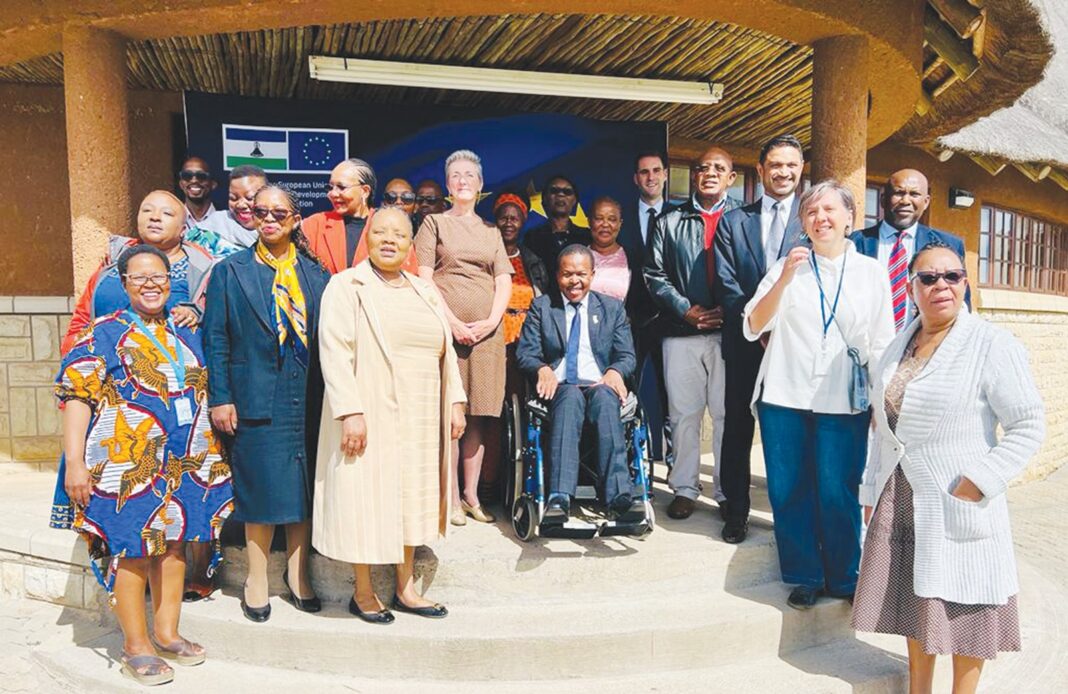By Neo Kolane
The United Nations Children’s Fund (UNICEF) and the European Union (EU) will this year implement the fourth and final phase of a partnership with the government to further strengthen Lesotho’s social protection systems.
The phase, which will run until 2026, will see the two organisations supporting the government under an initiative called ‘Equitable Lesotho’ (Ntlafatsa Bana).
Addressing a meeting with principal chiefs in Thaba Bosiu this week, UNICEF representative Deepak Bhaskaran said having a conducive policy framework was important to effectively reach the most vulnerable populations.
He cited the National Social Protection on Strategy (NSPS) II and the National Information System for Social Assistance (NISSA), which he described as vital tools to offer social protection to the needy.
“During the next three years, we want to ensure social protection helps support the transition towards a more sustainable, low-carbon, and digitally driven economy for Lesotho,” Bhaskaran told the meeting.
He said support will be provided to scale up payments of cash grants through digital means, including mobile payments or the banking system. Another crucial area of support in this fourth phase will be improving access to social services for children and their families. This will include improving access to clean water and promoting community-based nutrition interventions for young children, he noted.
“By doing so, we hope that the benefits of green and digital transitions are shared equitably across society, particularly among the most vulnerable members. For this reason, our new collaboration with the EU and the Ministry of Gender, Youth Sport, Culture and Social Development will focus on supporting the child grant programme to make sure, among others, that children have more access to sustainable sources of energy and benefit from a digital birth registration system and also a digital registration into NISSA.”
During Phase I, which ran from 2007 to 2011, the EU and UNICEF supported the government in defining, designing and rolling out the Child Grants Programme (the CGP) and its registry, NSPS II 2021-2031). The programme reached 10,000 households and 27,000 children at the end of the four years.
During the second phase between 2012 and 2014, the two organisations focused on transitioning the CDGP to the government.
Finally, phase three of the partnership went from 2015 to 2022. It focused on further strengthening the country’s social protection system, expanding NISSA to urban areas.
NSPS II, which was launched by the government in December 2022, is an information system that helps in identifying households in need of government support through social protection. It contains information on over 90 percent of all households in Lesotho.
On the other hand, NISSA is a single registry or database launched in 2010 to help the government coordinate its social protection programmes. It is also used to store socio-economic data for targeting, planning and management of functions such as delivery of social payments, case management, monitoring and evaluation of social assistance initiatives such as the Child Grant Programme.
Bhaskaran revealed that Lesotho has been a forerunner and champion for social protection in Africa.
“Since 2007, the government of Lesotho, the EU and UNICEF have partnered to contribute to building a social protection system in Lesotho. The partnership that has thus been consolidated for over 15 years has contributed to building a solid and stable social protection system in the country.
“Lesotho now has one of the most integrated and progressive social protection systems in the region and we are happy to be part of this process,” he said.
Social protection refers to measures put in place by governments to provide support and assistance to vulnerable individuals and communities. This includes healthcare, education, social security and cash transfer programmes.
The meeting with principal chiefs and other stakeholders was hosted by the Ministry of Gender, Youth, Sports and Social Development to sensitise them on the NSPS II and NISSA programmes.
Speaking at the same meeting, Head of the European Union (EU) Delegation to Lesotho, Ambassador Paola Amadei applauded the government for increasing the budget allocation for social protection measures.
She said the increase of child grants from M120 per month to M2000 per month, an increase of 67 percent, would help alleviate the plight of disadvantaged children.
She also hailed the digitalisation of payments, saying this would allow recipients to save on transport costs and having to queue at pay points.
Lesotho had over the last two decades made significant progress in reducing poverty. This was reflected in the declining number of people classified as poor according to international surveys, she said.
“These achievements were made possible by the government’s investment in social protection programmes, such as the child grant programme,” Amadei added.
However, she noted that new challenges had risen in the past few years impacting negatively on the most vulnerable members of society. These included the COVID-19 pandemic and the rise in fuel and food prices linked to Russia’s war against Ukraine.









